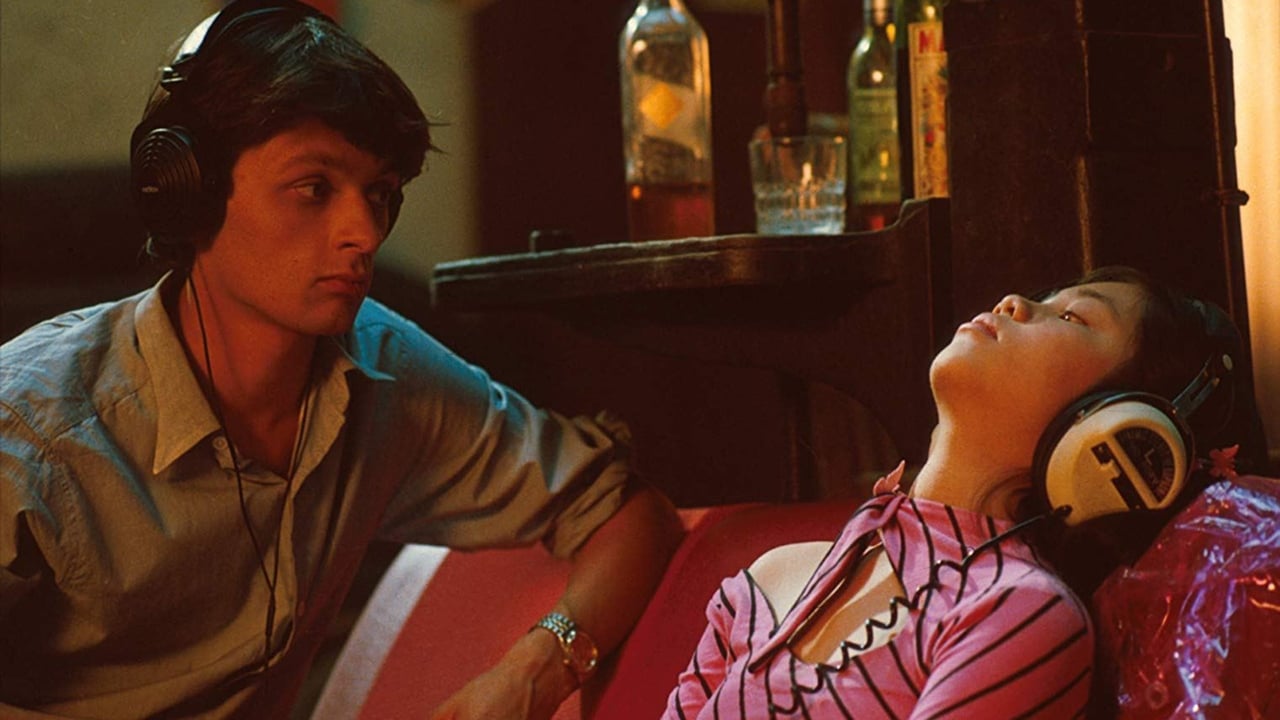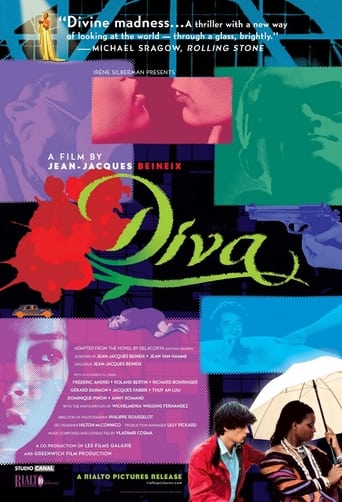



Self-important, over-dramatic, uninspired.
Redundant and unnecessary.
Excellent, Without a doubt!!
The movie turns out to be a little better than the average. Starting from a romantic formula often seen in the cinema, it ends in the most predictable (and somewhat bland) way.
View MoreThis film has a dual plot line in which dirty cops are after the main character because they believe he has a cassette tape incriminating their boss in prostitution and drug trafficking. At the same time, Jules (Frédéric Andréi) has created his own tape of a famous operatic singer who refuses to have her own voice recorded as an affront by those who would profit from it. It's an interesting double bind Jules finds himself in, even though for a good portion of the story he's unaware that the tape he holds of a crooked chief inspector is in his possession; it was secretly dropped into his mail satchel by the mistress of Commissaire Saporta (Jacques Fabbri) while on the run from the thugs he set out after her. For whatever reason, even for all it's intrigue, I couldn't quite connect with this story. It's not hard to follow if one pays attention, and the opera star Cynthia Hawkins (Wilhelmenia Fernandez) has the most beautiful voice, but the characters and situations ultimately didn't engage me in a meaningful way. The eventual confrontation between the corrupt Chief Inspector and Jules ends in the most ignominious way when the cop falls off of an elevated landing in a warehouse when the lights go out. That just seemed so lame to me. No doubt others will find much more intrigue and mystery to the film than this viewer did, so in keeping with a time honored phrase designed to keep you invested in the story until it's conclusion, I would simply state, it's not over until the black lady sings.
View MoreOverambition is always risky. Diva is so plot heavy that it almost cracks, but it is delicious and entertaining. As far as genre is concerned, this movie flirts with several, but I think it is safe to label Diva as essentially a neo noir. It is darkly romantic, full of corruption, and photographed in spectacular fashion. The colours are rich and the camera work is exquisite. The movie is almost great but not quite. In an attempt to bring everything together, it has a little climax trouble. A tape of evidence with exposes the Chief inspector of Paris as crooked ends up in the moped satchel of a mail boy named Jules, who suddenly finds himself being hunted down by goons with guns. But that's not his only problem. Jules has made a secret recording of his favourite opera singer live in concert. This singer has blatantly refused to do any recordings, and when word gets out that such a recording exists, different people are going after it. It is ever more essential that Jules keep it hidden, considering, that he and his singer friend have become intimate friends. Even though Diva enjoys piling it up by the pound, it does so in a compelling fashion. It is a good balance of bold and slick. There are a few clichés buried beneath the labyrinth plot that a picky person may be drawn to pick out, but I enjoyed Diva for its sense of non- convention. It puts character before character type, and tension above twist. Cinematography plays an exceptional role in this motion picture, which captures Paris in a far more exuberant way than I am used to seeing (and I've been there). One item about the city which has never appeal to me is that it is very grey, with not enough green. Grey is the last of the colours on Diva's colour pallet (execpt when necessary). This motion picture prefers something a little more romantic or expressive. like a jazzy blue, or a fiery red. I can easily give Diva a pass, and I can recommend it on numerous grounds. As a non-Hollywood thriller, Diva is exceptional, but it is not a film for the soft minded. It gets a bit too convoluted, not too messy, but there is a sense that it could use a slight reworking. This is not a light motion picture, but it ain't a dull one either.
View MoreThis film isn't about piracy, prostitution, blackmail or even murder- although it has loads of all that. At its heart, Diva is about music- no, not the loud jarring sort but the kind that occupies the space between silences. And we don't just listen to it; what is more, we actually see this music: in the eerie emptiness of Diva's cinematography; in the uncluttered labyrinth of Parisian urban lofts; on an enchanted castle by the sea; in the surprisingly meaningful relationships between strangers; and in the wild applause of an empty opera house. Beineix's weaves a world that is, for lack of a better word, hypnotic. And we, his viewers, simply drift through it.
View MoreDiva (1981): Frederic Andrei, Wilhelmenia Fernandez, Thuy An Lu, Richard Bohringer, Jacques Fabbri, Chantal Deruaz, Anny Romand, Roland Bertin, Gerard Darmon, Dominique Pinon, Jean Jacques Moreau, Patrick Floersheim, Raymond Aquilon, Eugene Berthier, Gerard Chaillou....Director Jean Jacques Beineix, Screenplay Jean Jacques Beineix Adapted from the novel by Daniel Odier, this 1981-1982 film from French director Jean Jacques Beineix marked a new wave of French cinema for the 1980's. Previous French films in the 1970's were darker and moodier, more pretentious in many ways and a lot more philosophical/intellectually serious in their art-house endeavor. But "Diva" is a combination of art-house, comedy and thriller made up in a colorful fabric of cinematography, nuanced acting, beautiful music and an engaging story. It's "deluxe look" employs many of the "advertisement" gimmicks from popular 1980's French magazines. It's a slow moving movie, so for anyone seeing it for the first time, it should feel as long as any foreign film usually does. The topping on the artsy cake is Italian opera - the constant use of the soprano aria "Ebben N'andro lontano" from Catalani's "La Wally" is forever linked to this movie. The French cultural signature is on this but it's nothing heavy. It does lead up to a climatic finale and has all the ingredients of the typical thriller fiction - detectives trying to locate the bad guy and bring him to justice. There are chases both by car and foot, attempted murder and a murder, and the seedier side of Paris (prostitution, drugs, white slavery, poverty) despite the genuine goodness of the lead characters. It's a movie that seems to want to emulate modern American movies, especially in its touches of comedy and comic relief, and in the attitudes of the characters, who, despite being youth of the 1980's, also seem to be reminders of counterculture from the 1960's and 1970's, free spirited, hippie-intellectuals.Set in President Mitterand's early 1980's Paris, the film follows what appears to be an episode in the life of a poor, bohemian dreamer and postal worker Jules (Frederic Andrei). His romantic obsession for the African-American opera singer Cynthia Hawkins (Wilhelmenia Fernandez) leads him to secretly tape record her singing voice at a Paris concert. His intentions are pure. He wants to keep a memento of her and to have access to her beautiful voice from his own home. He also boldly steals one of her expensive gowns (this out of sexual longing, like stealing a woman's panties). But before long, he finds himself involved in a plot involving a murdered prostitute, two police detectives and the head of a drug cartel and prostitution ring. The recording also featured the confession of the prostitute who was murdered, who had sought to expose a corrupt Police Captain who had been operating as prostitution ring from Africa and Paris. This forces Jules to become involved in a sticky situation and he's soon being hunted by both the cops and the baddies, each trying to get that tape that's in his possession. It also calls for the eponymous diva, who has long refused to make recordings, to consider finally recording her voice to save herself.Among the characters that compose the "good guy" group are Gorodish Richard Bohringer) and his Vietnamese lover Alba (Thuy An Luu) who is a kind of chic "thief" and bohemian girl. Gorodish is a loner, lives in a large but unfurnished loft where he is constantly meditating to low-bass New Age music and thinking of strange things like trying to stop the "ocean waves". Jules is himself an artist and collects (through theft) various objects which he uses for artwork a la Andy Warhol. Strangely enough, it's this strange poor prophet who saves Jules' lives when it's endangered by the Mafia-type men who seek to destroy the tape he made. But even these bad guys (Gerard Darmon and Dominique Pinon) are straight of comedy as Le Cure constantly expresses his hatred of garages, police and everything. The comedy is in the perfectly timed dialogue scenes. This is also a cop movie. Jean and Nadia (Jacques Fabbri and Chantal Deruaz) are a male-female detective duo who are hot on the trail of the men responsible for killing the hooker and eventually discover the police Captain's corrupt alter ego.Perhaps the most touching aspect of the film is the romance. Jules and Cynthia Hawkins have a connection - opera. Jules is an opera connoisseur and admires Cynthia so much he followed her from Paris to Munich, always on his mini bike/motorcycle/mobilette. He is physically drawn to her but they don't engage in sexual activity, not even after what seems to be a romantic date. Cynthia is a proud black artist (probably modeled after real life 80's divas like Jessye Norman and Kathleen Battle) who believes that business ought to work its way around art. She has integrity and refuses to be part of a commercial enterprise and to "sell out". A more romantic and yet restrained and sober relationship on film you'll be hard-pressed to find. I enjoyed this film and highly recommend it to any French culture class. This is one of the early masterpieces of French cinema "du look" from the 1980's.
View More